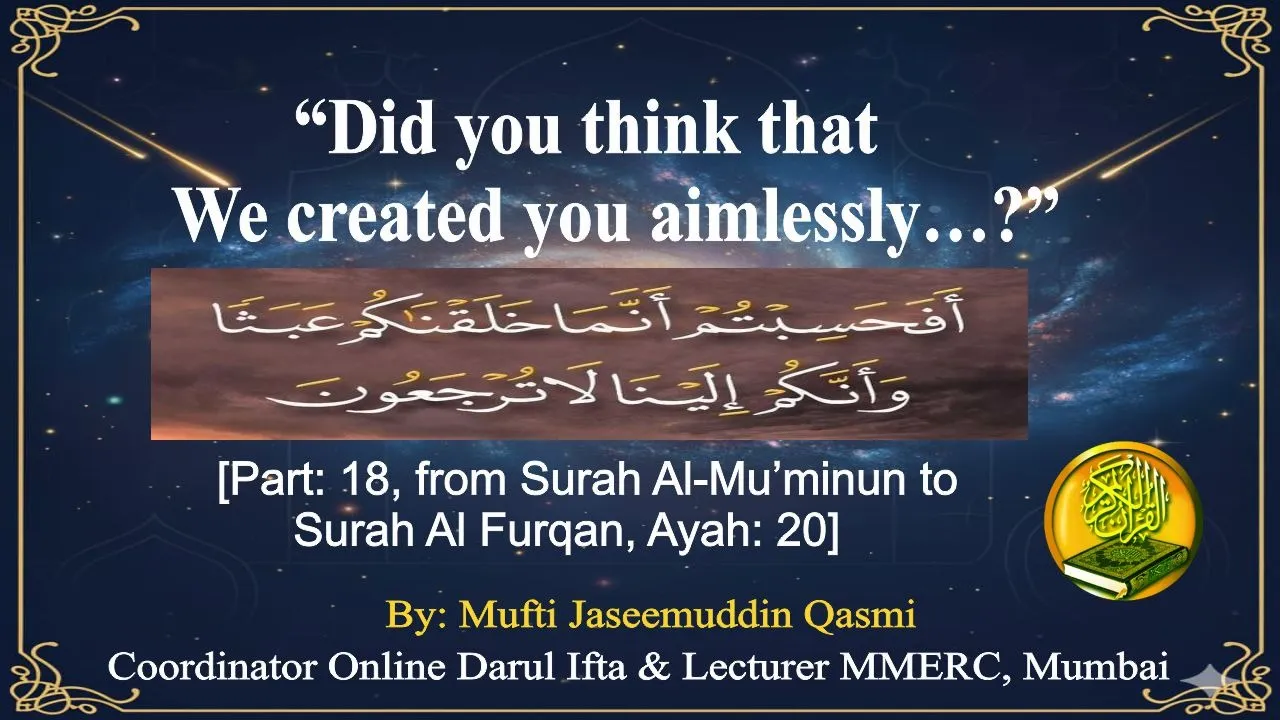
“Did you think that We created you aimlessly…?”
“Did you think that We created you aimlessly…?”
[Part: 18, from Surah Al-Mu’minun to Surah Al Furqan, Ayah: 20]
By: Mufti Jaseemuddin Qasmi
Coordinator Online Darul Ifta & Lecturer
MMERC, Mumbai
Surah Al-Mu’minun
﷽
The Seven Qualities that Guarantee Success
Part 18 begins with Surah Al-Mu’minun. This is a Makkan surah consisting of 118 ayahs. In its very first ayah, Allah declares: “Indeed, the believers have attained success.” The surah then outlines the seven defining qualities of those true believers who shall inherit Jannat al-Firdaws.
These seven qualities are so comprehensive that when Sayyidah ‘A’ishah (ra) was asked about the character of the Prophet (saws), she recited the opening ten ayahs of Surah Al-Mu’minun in response.
The seven qualities that guarantee success are:
- Performing salah with deep humility and fear of Allah,
- Avoiding idle and useless talk,
- Giving zakah,
- Guarding their chastity and fulfilling their desires only with their wives or those whom their right hands possess,
- Being faithful in keeping trusts,
- Honoring and fulfilling their covenants and promises,
- Observing salah with consistency and regularity.
Ayah 12 of Surah Mu’minun says, “Certainly We created man from an extract of clay.”
Man’s creation from clay means that either all human beings’ forefather, Prophet Adam (as), was created from clay, or that man’s creation originates from a drop of semen, which itself comes from food, and food grows and develops with the contribution of soil.
Up to ayah 16, Allah Almighty has mentioned the stages of human life in order to draw attention towards the purpose of existence.
Ayahs from 23 to 29 narrate the story of prophet Nuh (as). And then in ayah 32, Allah says, “Then We created after them another generation.” That is, it refers to the people of ʿĀd or the people of Thamūd. Up to Ayah 41 of Surah Mu’minun, the same people are mentioned — that they did not obey their prophet and did not believe in the Hereafter. Therefore, Allah destroyed them with a thunderous blast and brought forth another nation in their place.
In ayah 44, Allah says, “Then We sent Our messengers in succession. Every time there came to a nation its messenger, they denied him, so We made them follow one another [to destruction], and We made them tales. So away with people who do not believe.”
After that, up to ayah 49, the story of Prophet Musa (as) and Prophet Harun (as) is mentioned.
The birth of Prophet ʿĪsā (as) without a father
The explanation of ayah 50 is that Prophet ʿĪsā (as) was born without a father, in Bethlehem, as a sign of Allah’s power. The king of Bethlehem became hostile toward his mother, so Maryam (as) had to leave concealing herself and her child in a place beyond the king’s reach. The Qur’an tells us that Allah sheltered them in an elevated place that was both peaceful and tranquil, and where a spring flowed to provide for their needs.

Ayah 52 and 53 of Surah Al-Mu’minun say “And indeed this, your religion, is only one religion, and I am your Lord, so fear Me. But the people divided their religion among them into sects – each faction, rejoicing in what it has.”
It means that all the Prophets were united in the fundamental principles of religion, but later people distorted it and created separate sects.
Further, Allah said that We have the power to show the Punishment as well, but wisdom does not lie in that. You should adopt patience, and the command was given:
“(But until that time comes) Keep repelling evil in the manner that is best…”
Further, Allah says about the Day of Judgment in ayah 101 of Surah Mu’minun, “So when the Horn is blown, no relationship will there be among them that Day, nor will they ask about one another.”
In ayah 115, Allah says, “Then did you think that We created you aimlessly and that you would not be returned to Us?”
Surah An-Nur
﷽
Here begins Surah An-Nur. This is Madani Surah and it consists of 64 ayahs. Its central theme is to provide the necessary guidance and commands to prevent immorality and indecency in society and to promote chastity and purity. This Surah also includes instructions regarding veils and household etiquette. That is why, during his caliphate, Hazrat ʿUmar (ra) wrote in a directive to the governors: “ʿAllimū nisāʾakum Sūrah an-Nūr” — meaning, “Teach your women Surah An-Nur.”
Punishment for Fornication
In ayah 2, the punishment for adultery has been mentioned, and this applies to an unmarried man and woman. Thus, it is stated:
“The (unmarried) woman or (unmarried) man found guilty of sexual intercourse – lash each one of them with a hundred lashes, and do not be taken by pity for them in the religion of Allah, if you believe in Allah and the Last Day. And let a group of the believers witness their punishment.”
If the adulterer is married, then his punishment is rajm (stoning to death).In ayah 3 it is stated: “The adulterer shall not marry except an adulteress or a polytheist woman, and none shall marry an adulteress except an adulterer or a polytheist; and this is forbidden for the believers.”
It means a person who is habitual of fornication, who neither feels ashamed of it nor repents from it, naturally finds attraction towards a woman who is also immoral. Therefore, he either remains engaged in fornication itself, or if he needs to marry, he desires to marry such a woman, even if she is a polytheist. The same applies to an adulteress woman — she tends to seek a partner who is an adulterer or a polytheist.
For Muslims, it is forbidden to deliberately choose an immoral man or woman for marriage. They must give due importance to piety and chastity when selecting a life partner. However, if someone does marry an adulterer or adulteress, such a marriage will not be considered invalid; it will remain legally valid and all rulings of marriage will apply. But the sin of making such a wrong choice will still remain.
It should also be clarified that this ruling concerns habitual sinners who have not repented from their indecency. But if someone sincerely repents, then there is no harm in marrying him or her.
Punishment for Accusing Someone of Adultery
In ayah 4 of Surah An Nur, the prescribed punishment for qazf (falsely accusing someone of adultery) is mentioned. Allah says: “And those who accuse chaste women but do not produce four witnesses — flog them with eighty lashes, and never accept their testimony again; and they are themselves transgressors.”
It is further stated that if such people repent, Allah is Forgiving and Merciful — meaning the sin of this crime will be forgiven. However, the worldly punishments mentioned above will still be implemented.
Ruling about Li‘ā
From ayah 6 to ayah 9 of Surah An Nur, ruling about Li‘ān is mentioned, that is, if husband accuses his wife of adultery, then what will happen? So, the Qur’an says about it, “And those who accuse their wives (of adultery) and have no witnesses except themselves – then such a person must testify four times swearing by Allah that indeed, he is of the truthful. And the fifth oath will be that the curse of Allah be upon him if he should be among the liars. But it will prevent punishment from her if she gives four testimonies swearing by Allah that indeed, he is of the liars. And the fifth oath will be that the wrath of Allah be upon her if he was of the truthful.”
Because of the special nature of the relationship between husband and wife, Allah has prescribed a separate and special procedure for them instead of the punishment of qadhf. In Islamic terminology, this procedure is called Li‘ān. This procedure is explained in these ayahs, the summary of which is as follows:
The judge (qazi) will ask both the husband and the wife to take five oaths each in the specific words mentioned in these ayahs, and before that he will admonish both of them by saying that the punishment of the Hereafter is far more severe than the punishment of this world; therefore, instead of taking a false oath, they should admit the truth.
If the wife, instead of swearing, admits her sin, then the punishment of adultery will be carried out upon her. If the husband, instead of swearing, admits that he made a false accusation, then the punishment of qadhf mentioned in ayah 4 will be carried out upon him.
If both take the oaths, then no worldly punishment will be enforced upon either of them. However, after that the judge will annul the marriage between them. And if a child is born and the husband refuses to acknowledge the child as his, then the child will only be attributed to the mother.
The Exoneration of ʿĀ’ishah al-Ṣiddīqah (ra)
Ayahs from 11 to 20 were revealed concerning the exoneration of Umm al-Mu’minīn ʿĀ’ishah Ṣiddīqah (RA), as the ayah 11 states:
Indeed, those who came with falsehood are a group among you. Do not think it bad for you; rather it is good for you. Each person among them bears his share in the sin he has committed. As for him who played the major role—for him is a terrible punishment.
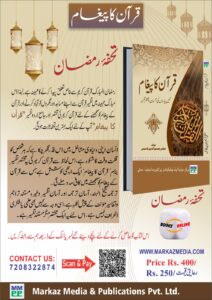
In Madinah, the disbelievers and the hypocrites would constantly try to defame Islam and the Muslims. During the Battle of Banū al-Muṣṭaliq, the army camped at one place, and there ʿĀ’ishah (RA) lost a necklace. While searching for it, she was left behind from the caravan.
It was customary among caravans that one person would be appointed to remain at the very rear, so that after the caravan had departed; he could check whether anything had been left behind. In this caravan, the Prophet (saws) had appointed Ṣafwān ibn al-Muʿaṭṭal (ra) for this duty. When he passed by the place where ʿĀ’ishah (ra) was sitting, he got to know the incident. He then brought his camel forward and offered it to the Mother of the Believers, upon which she mounted and thus reached Madinah safely.
The hypocrites’ leader, ʿAbdullāh ibn Ubai, turned this incident into a scandal, alleging that ʿĀ’ishah (as) had traveled alone with Ṣafwān ibn al-Muʿaṭṭal (as), and thereby cast a vile accusation against her. ʿAbdullāh ibn Ubai spread this slander so widely that even two or three simple-minded Muslims fell into his deception. In this way, for several days such baseless talk was circulated among the people.
Allah declared that although this incident appeared to be extremely painful outwardly, in the end it proved to be entirely in your favor. Firstly, because through it those who continuously conspired against the family of Prophet (sa) were exposed. Secondly, it revealed to people the exalted status of Lady ʿĀ’ishah(ra).
In the following ayahs, a warning is given that those who heard this accusation should have immediately rejected it, and that one must not speak about such matters without proper verification. This ruling is general in nature: whenever an accusation is made against anyone, it must not be spread before careful investigation.
Do Not Enter Anyone’s House Without Permission
In ayahs 27, 28, and 29 of Surah An Nur, it is commanded that when you wish to enter someone’s house, you must first seek permission from the residents and offer greetings; do not enter before doing so. And if you are asked to return, then return immediately. This brings purity and decency to society. However, what is meant here are private residences, not public places such as hospitals, inns, or educational institutions, which are not included in this ruling.
Command of Lowering the Gaze for Men and Women
In ayahs 30 and 31 of Surah An Nur, both men and women are commanded to lower their gaze. Today, it is often assumed that this command applies only to men, and that if a woman is veiled yet looks at non-mahram men, there is nothing wrong in it. This is incorrect. For example, on one occasion, one of the Mothers of the Believers (ra) came before a blind Companion without wearing the veil. The Prophet (sa) said: He cannot see you, but you can see him, and he instructed her to observe the veil.
However, there is no veil required between a woman and her husband or her mahram relatives, provided there is no fear of temptation. In the last ayah of the fourth Part of Qur’an’, the details of who counts as non-mahram have already been explained. Likewise, veil is not required from children or elderly servants who have no sexual desire.
Furthermore, women are instructed not to stamp their feet while walking in such a manner that the sound of their anklets or sandals draws the attention of others.
Delay in Marriage Due to Financial Issue
In ayah 32, it is advised that when men and women reach maturity and are capable of marriage, their families and community make efforts to arrange their marriage. One should not delay marriage merely on account of financial problem. Rather, if one marries with trust in Allah, He will provide them with financial ease.
After this, the qualities of the righteous are described. The deeds of the disbelievers are likened to a mirage; misguidance is compared to overwhelming darkness; and guidance is likened to radiant light. Every creature has been created by Allah from water. From ayah 47 onwards, several ayahs discuss the hypocrites.
Household Etiquette for Children
In ayah 58, guidance is given regarding servants and young children: during times of privacy, they should not enter the bedrooms without permission.
The summary of ayah 60 is that although elderly women of advanced age are exempted from the strict rulings of veiling, they are still encouraged to observe modesty.
There were some individuals who were blind, physically disabled, or ill, who felt hesitant to eat with others together. They feared that others might feel uncomfortable eating with them, or that due to their disability they might occupy more space, or that blindness might cause them to eat more than others. On the other hand, healthy individuals sometimes felt uneasy, thinking that the disabled might not be able to keep up with them and would therefore eat less, failing to take their fair share from the common meal. Ayah 61 clarified that in informal situations such concerns are unnecessary. It was through such impartial and dignified rulings of Islam that many people from communities bound by the rigid notions of untouchability were drawn to the mercy of Islam and embraced it.
Using Someone’s Belongings Without Permission
The same ayah also states that if it is certain that the owner would be pleased with the use of his belongings, and then there is no harm in using them without explicit permission. However, if there is any doubt about this, then one must not use them—even if the belongings belong to very close relatives.
Ayah 62 was revealed on the occasion of the Battle of the Ahzab, condemning those hypocrites who would slip away from the work of digging the trench without seeking permission.
Sūrah al-Furqān
﷽
Here begins Sūrah al-Furqān. This is a Makkan sūrah consisting of 77 ayahs. The central purpose of this chapter is to affirm the fundamental beliefs of Islam and to respond to the various objections raised by the disbelievers of Makkah regarding them. It also reminds mankind of the countless blessings that Allah has created in the universe for their benefit, thereby calling them to obey Him, acknowledge His Oneness, and turn away from all forms of polytheism.
You May Also Like
 Qur'anic Wisdom
Qur'anic Wisdom“Had there been within the heavens and earth gods besides Allah, they both would have been ruined”
“Had there been within the heavens and earth gods besides Allah, they both would...
 Qur'anic Wisdom
Qur'anic Wisdom“Whoever turns away from My remembrance, indeed, he will have a life of great hardship”
“Whoever turns away from My remembrance, indeed, he will have a life of great...
 Qur'anic Wisdom
Qur'anic WisdomDon’t Kill Your Children Due to Fear of Poverty, We Provide You and Them Sustenance
Don’t Kill Your Children Due to Fear of Poverty, We Provide You and Them...
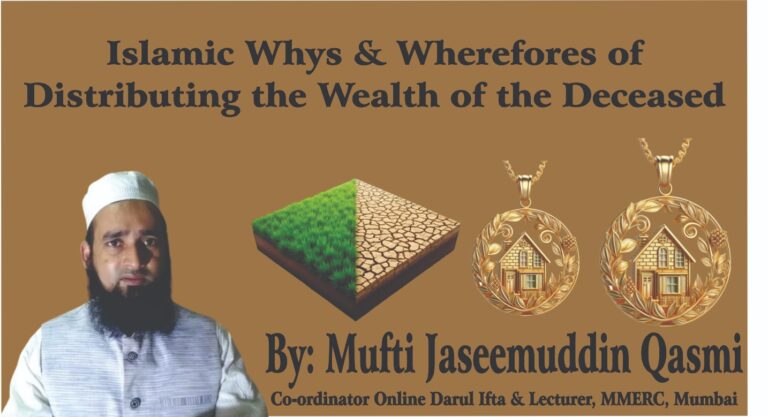 Prophetic Injunctions
Prophetic InjunctionsIslamic Whys & Wherefores of Distributing the Wealth of the Deceased
Islamic Whys & Wherefores of Distributing the Wealth of the Deceased By: Mufti Jaseemuddin...
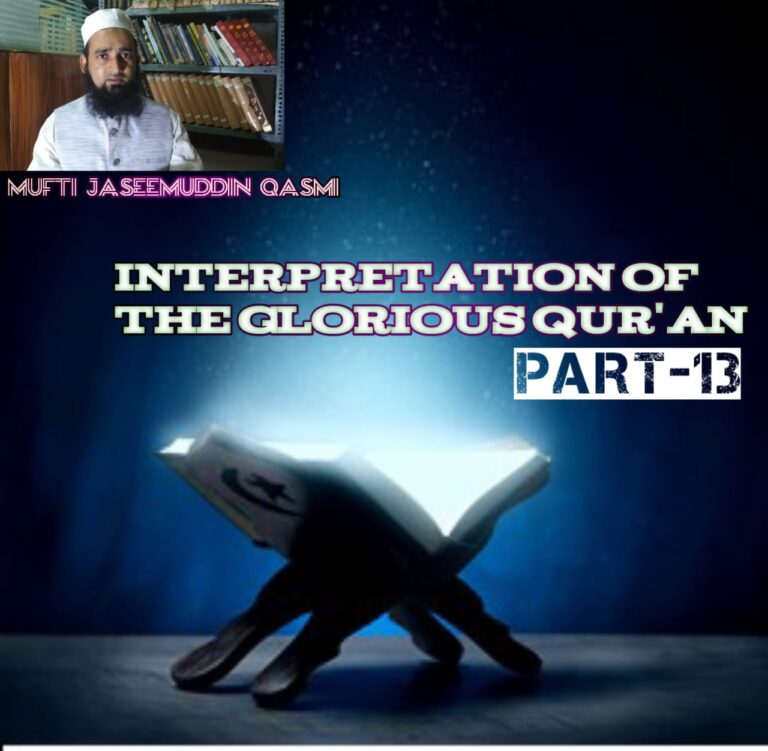 Islam
IslamIndeed, Allah does not change the condition of a people until they change what is in themselves
Indeed, Allah does not change the condition of a people until they change what...
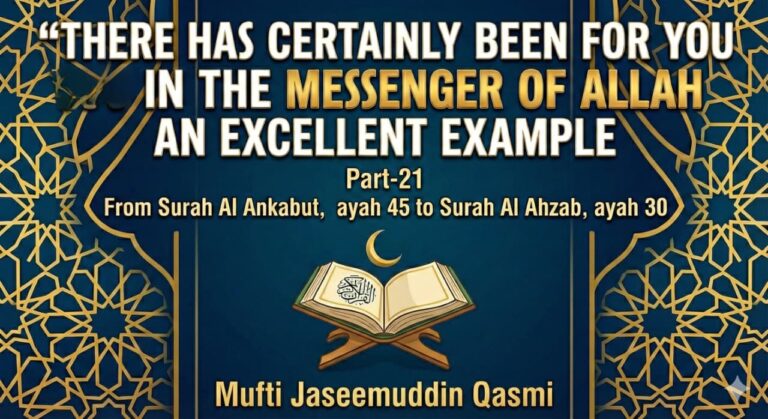 Qur'anic Wisdom
Qur'anic WisdomThere Has Certainly Been For You in the Messenger of Allah an Excellent Example
There Has Certainly Been For You in the Messenger of Allah an Excellent Example...

Comments (0)
Leave a Comment